Documentation
metaX.dataset
1. Meta-Learning
1) Omniglot
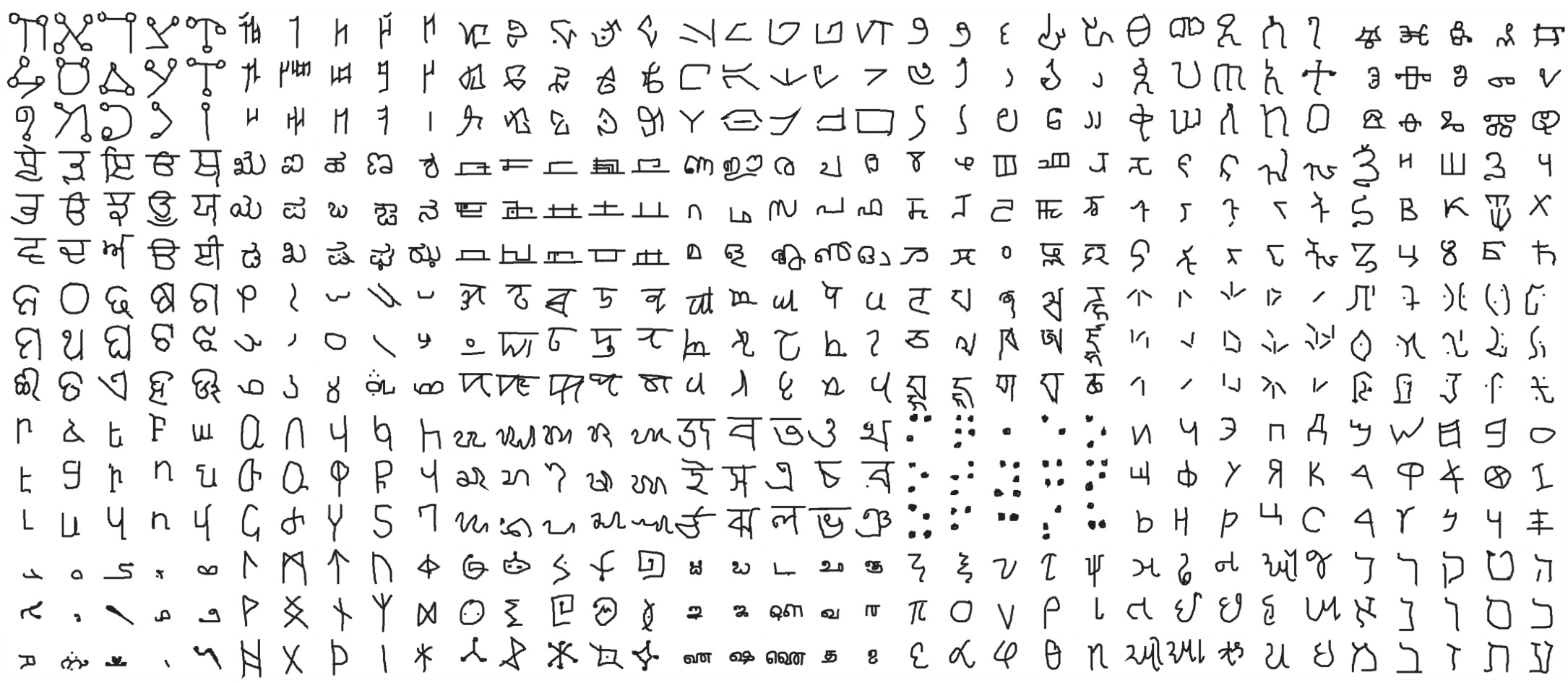
Example of omniglot dataset
Description
Omniglot dataset is generally used for one-shot learning. It contains 1623 different handwritten characters from 50 different alphabets written by 20 different people. That > means, it has 1623 classes with 20 examples each. Each image is of size 105x105.
from metaX.datasets import OmniglotDatabase
database = OmniglotDatabase(
raw_data_address="dataset\raw_data\omniglot",
random_seed=47,
num_train_classes=1200,
num_val_classes=100)
Arguments
- raw_data_address (str) - Omniglot raw data path.
- random_seed (int, default=-1) - Random seed value.
- num_train_classes (int) - Number of train classes.
- num_val_classes (int) - Number of validation classes.
2) MiniImageNet
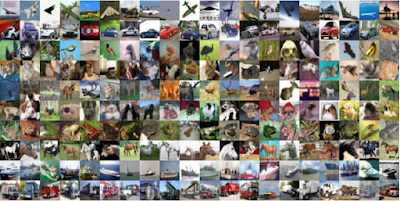
Example of MiniImageNet dataset
Description
MiniImageNet dataset is generally used for few-shot learning. This dataset contains 100 different classes in total that are divided into training, validation and test class splits.
from metaX.datasets import MiniImagenetDatabase
database=MiniImagenetDatabase(
raw_data_address="\dataset\raw_data\mini_imagenet",
random_seed=-1)
Arguments
- raw_data_address (str) - MiniImageNet raw data path.
- random_seed (int, default=-1) - Random seed value.
3) CropDisease

Example of CropDisease dataset
Description
CropDisease dataset is one of the CD-FSL(Cross-Dimain Few-Shot Learning). This dataset contains 38 different classes in total that have diseased and healthy palnt leaves.
from metaX.datasets import CropDiseaseDatabase
database=CropDiseaseDatabase(
raw_data_address="\dataset\raw_data\cropdisease",
random_seed=-1)
Arguments
- raw_data_address (str) - CropDisease raw data path.
- random_seed (int, default=-1) - Random seed value.
4) EuroSAT
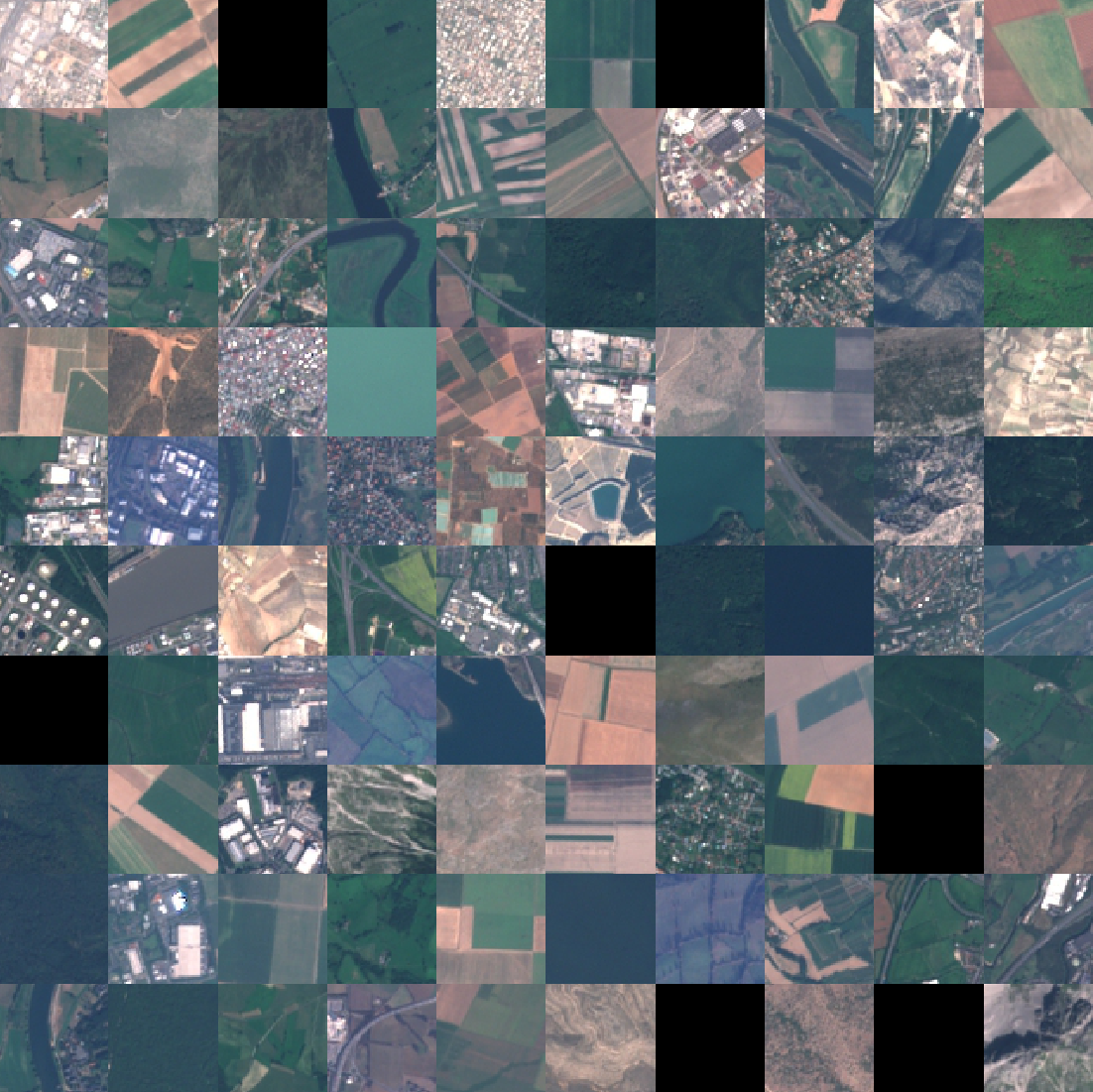
Example of EuroSAT dataset
Description
EuroSAT dataset is based on Sentinel-2 satellite imagery covering 13 spectral bands and consists of 10 classes containing 27000 labeled and georeferenced samples.
from metaX.datasets import EuroSATDatabase
database=EuroSATDatabase(
raw_data_address="\dataset\raw_data\eurosat",
random_seed=-1)
Arguments
- raw_data_address (str) - EuroSAT raw data path.
- random_seed (int, default=-1) - Random seed value.
5) ISIC
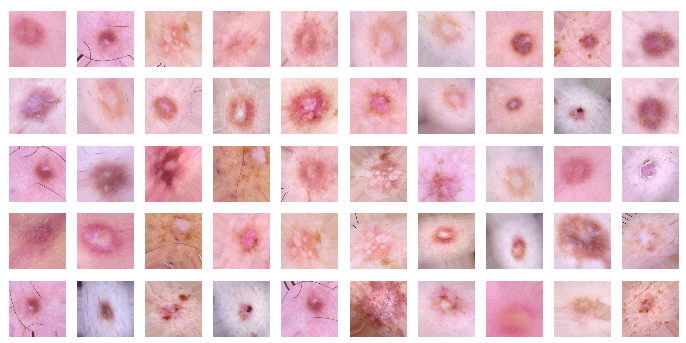
Example of ISIC dataset
Description
ISIC dataset is from the ISIC Machine Learning Callenges. There are 8010 samples in the training dataset for seven disease categories which are Melanoma (M), Melanocytic nevus (N), Basal cell carcinoma (BCC), Actinic keratosis / Bowen's disease-intraepithelial carcinoma (AK), Benign keratosis- solar lentigo / seborrheic keratosis / lichen planus-like keratosis (PBK), Dermatofibroma (D) and Vascular lesion (VL).
from metaX.datasets import ISICDatabase
database=ISICDatabase(
raw_data_address="\dataset\raw_data\isic",
random_seed=-1)
Arguments
- raw_data_address (str) - ISIC raw data path.
- random_seed (int, default=-1) - Random seed value.
6) ChestX
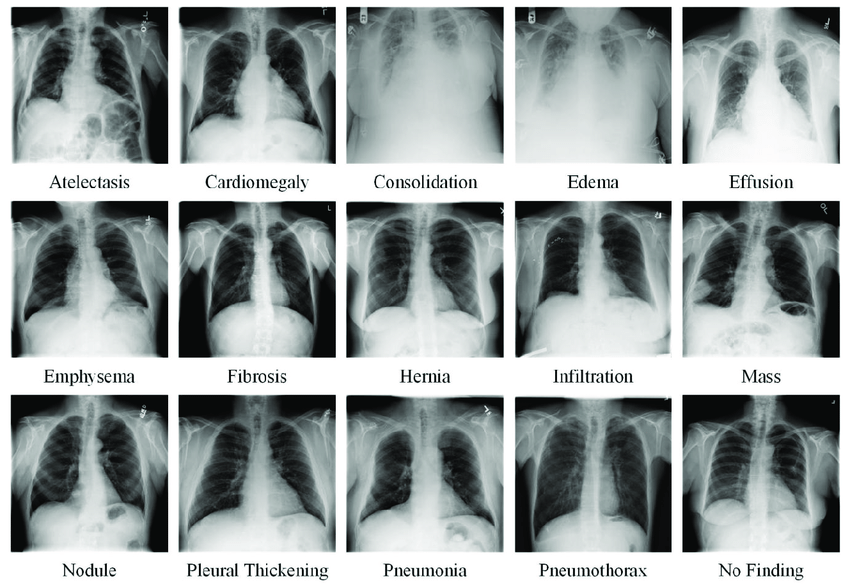
Example of ChestX dataset
Description
Chest X dataset contains 108,948 frontalview X-ray images of 32,717 unique patients with the textmined eight disease image labels (where each image can have multi-labels), from the associated radiological reports.
from metaX.datasets import ChestXDatabase
database=ChestXDatabase(
raw_data_address="\dataset\raw_data\chestx",
random_seed=-1)
Arguments
- raw_data_address (str) - ChestX raw data path.
- random_seed (int, default=-1) - Random seed value.
2. Multimodal Learning
1) Korean Tourist Spot(KTS)

Example of KTS dataset
Description
The KTS Dataset is consists of data on 10 labels related to tourist spots in Korea collected from the Instagram.
from metaX.datasets import KTSDatabase
database=KTSDatabase(
raw_data_address="\dataset\raw_data\kts",
random_seed=-1)
Arguments
- raw_data_address (str) - KTS raw data path.
- random_seed (int, default=-1) - Random seed value.
2) Oxford Flowers 102

Example of Oxford Flowers 102 dataset
Description
Oxford Flowers 102 dataset is a consistent of 102 flower categories commonly occurring in the United Kingdom. Each class consists of between 40 and 258 images. The images have large scale, pose and light variations. In addition, there are categories that have large variations within the category and several very similar categories.
from metaX.datasets import FlowersDatabase
database=FlowersDatabase(
raw_data_address="\dataset\raw_data\flowers",
random_seed=-1)
Arguments
- raw_data_address (str) - Oxford flowers 102 raw data path.
- random_seed (int, default=-1) - Random seed value.
3) K-MSCOCO
2세부 작성
4) K-VQA
2세부 작성
metaX.model
1. Metric-based
1) Siamese Network
Siamese_Network
Description
High-level implementation of Siamese Network.
This class contains it with meta_train(), meta_test(), load_model() and predict_with_support() methods.
References (1) Koch, Gregory, et al.2015. “Siamese neural networks for one-shot image recognition.”
from metaX.model.metric_based.Siamese_Network import Siamese_Network
from metaX.model.metric_based.Siamese_Network import OmniglotModel
network_cls=OmniglotModel
siamese_network = Siamese_Network(args, database, network_cls)
Arguments
- args (parser.parse_args) - Arguments needed for meta-learning.
- database (database) - one of metaX.dataset. ex) OmniglotDatabase, MiniImagenetDatabase, etc.
- network_cls (MetaLearning) - one of metaX.model ex) OmniglotModel, MiniImagenetModel.
Methods
meta_train
Description
Do the metirc-based meta-training on network_cls with the siamese network method.
siamese_network.meta_train(epochs = args.epochs)
Arguments
- epochs (int) - number of epochs for meta_train.
meta_test
Description
Do the meta-test with the siamese network method. It prints the model accuracy on the meta-test dataset(unseen at training phase).
siamese_network.meta_test(iterations = args.iterations)
Arguments
- iterations (int) - number of iterations for fine turning at meta test.
load_model
Description
Load the parameters saved at the args.epochs epoch.
siamese_network.load_model(epochs = args.epochs)
Arguments
- epochs (int) - load for the saved model of epochs.
predict_with_support
Description
Return the predicted label of input data. It takes the data path to be predicted.
print(siamese_network.predict_with_support(meta_test_path='/dataset/data/omniglot/test'))
Arguments
- meta_test_path (str) - prediction and support data path for result.
2) Prototypical Network
Prototypical_Network
Description
High-level implementation of Prototypical Network.
This class contains it with meta_train(), meta_test(), load_model() and predict_with_support() methods.
References (1) Snell, Jake, et al.2017. “Prototypical networks for few-shot learning.”
from metaX.model.metric_based.Prototypical_Network import Prototypical_Network
from metaX.model.metric_based.Prototypical_Network import OmniglotModel
network_cls=OmniglotModel
prototypical_network = Prototypical_Network(args, database, network_cls)
Arguments
- args (parser.parse_args) - Arguments needed for meta-learning.
- database (database) - one of metaX.dataset. ex) OmniglotDatabase, MiniImagenetDatabase, etc.
- network_cls (MetaLearning) - one of metaX.model ex) OmniglotModel, MiniImagenetModel.
Methods
meta_train
Description
Do the metirc-based meta-training on network_cls with the prototypical network method.
prototypical_network.meta_train(epochs = args.epochs)
Arguments
- epochs (int) - number of epochs for meta_train.
meta_test
Description
Do the meta-test with the prototypical network method. It prints the model accuracy on the meta-test dataset(unseen at training phase).
prototypical_network.meta_test(iterations = args.iterations)
Arguments
- iterations (int) - number of iterations for fine turning at meta test.
load_model
Description
Load the parameters saved at the args.epochs epoch.
prototypical_network.load_model(epochs = args.epochs)
Arguments
- epochs (int) - load for the saved model of epochs.
predict_with_support
Description
Return the predicted label of input data. It takes the data path to be predicted.
print(prototypical_network.predict_with_support(meta_test_path='/dataset/data/omniglot/test'))
Arguments
- meta_test_path (str) - prediction and support data path for result.
2. Model-based
1) MANN
MANN
Description
High-level implementation of Memory-Augmented Neural Networks.
This class contains it with meta_train(), meta_test(), load_model() and predict_with_support() methods.
References (1) Santoro, Adam et al.2016. “Meta-learning with memory-augmented neural networks.”
from metaX.model.model_based.MANN import MANN
from metaX.model.model_based.MANN import OmniglotModel
network_cls=OmniglotModel
mann = MANN(args, database, network_cls)
Arguments
- args (parser.parse_args) - Arguments needed for meta-learning.
- database (database) - one of metaX.dataset. ex) OmniglotDatabase, MiniImagenetDatabase, etc.
- network_cls (MetaLearning) - one of metaX.model ex) OmniglotModel, MiniImagenetModel.
Methods
meta_train
Description
Do the model-based meta-training on network_cls with the Memory Augmented Neural Network method.
mann.meta_train(epochs = args.epochs)
Arguments
- epochs (int) - number of epochs for meta_train.
meta_test
Description
Do the meta-test with the MANN method. It prints the model accuracy on the meta-test dataset(unseen at training phase).
mann.meta_test(iterations = args.iterations)
Arguments
- iterations (int) - number of iterations for fine turning at meta test.
load_model
Description
Load the parameters saved at the args.epochs epoch.
mann.load_model(epochs = args.epochs)
Arguments
- epochs (int) - load for the saved model of epochs.
predict_with_support
Description
Return the predicted label of input data. It takes the data path to be predicted.
print(mann.predict_with_support(meta_test_path='/dataset/data/omniglot/test'))
Arguments
- meta_test_path (str) - prediction and support data path for result.
3. Optimization-based
1) MAML
ModelAgnosticMetaLearning
Description
High-level implementation of Model-Agnostic Meta-Learning.
This class contains it with meta_train(), meta_test(), load_model() and predict_with_support() methods.
References (1) Finn, Chelsea, et al.2017. “Model-agnostic meta-learning for fast adaptation of deep networks.”
from metaX.model.optimization_based.MAML import ModelAgnosticMetaLearning
from metaX.model.optimization_based.MAML import OmniglotModel
network_cls=OmniglotModel
maml = ModelAgnosticMetaLearning(args, database, network_cls)
Arguments
- args (parser.parse_args) - Arguments needed for meta-learning.
- database (database) - one of metaX.dataset. ex) OmniglotDatabase, MiniImagenetDatabase, etc.
- network_cls (MetaLearning) - one of metaX.model ex) OmniglotModel, MiniImagenetModel.
Methods
meta_train
Description
Do the optimaztion-based meta-training on network_cls with the Model-Agnostic Meta-Learning method.
maml.meta_train(epochs = args.epochs)
Arguments
- epochs (int) - number of epochs for meta_train.
meta_test
Description
Do the meta-test with the MAML method. It prints the model accuracy on the meta-test dataset(unseen at training phase).
maml.meta_test(iterations = args.iterations)
Arguments
- iterations (int) - number of iterations for fine turning at meta test.
load_model
Description
Load the parameters saved at the args.epochs epoch.
maml.load_model(epochs = args.epochs)
Arguments
- epochs (int) - load for the saved model of epochs.
predict_with_support
Description
Return the predicted label of input data. It takes the data path to be predicted.
print(maml.predict_with_support(meta_test_path='/dataset/data/omniglot/test'))
Arguments
- meta_test_path (str) - prediction and support data path for result.
2) Reptile
Reptile
Description
High-level implementation of Reptile.
This class contains it with meta_train(), meta_test(), load_model() and predict_with_support() methods.
References (1) Nichol, Alex, et al.2018. “On first-order meta-learning algorithms.”
from metaX.model.optimization_based.Reptile import Reptile
from metaX.model.optimization_based.Reptile import OmniglotModel
network_cls=OmniglotModel
reptile = Reptile(args, database, network_cls)
Arguments
- args (parser.parse_args) - Arguments needed for meta-learning.
- database (database) - one of metaX.dataset. ex) OmniglotDatabase, MiniImagenetDatabase, etc.
- network_cls (MetaLearning) - one of metaX.model ex) OmniglotModel, MiniImagenetModel.
Methods
meta_train
Description
Do the optimaztion-based meta-training on network_cls with the Reptile method.
reptile.meta_train(epochs = args.epochs)
Arguments
- epochs (int) - number of epochs for meta_train.
meta_test
Description
Do the meta-test with the Reptile method. It prints the model accuracy on the meta-test dataset(unseen at training phase).
reptile.meta_test(iterations = args.iterations)
Arguments
- iterations (int) - number of iterations for fine turning at meta test.
load_model
Description
Load the parameters saved at the args.epochs epoch.
reptile.load_model(epochs = args.epochs)
Arguments
- epochs (int) - load for the saved model of epochs.
predict_with_support
Description
Return the predicted label of input data. It takes the data path to be predicted.
print(reptile.predict_with_support(meta_test_path='/dataset/data/omniglot/test'))
Arguments
- meta_test_path (str) - prediction and support data path for result.
4. Heterogeneous_data_analysis
1) Heterogeneous Emedding
Heterogeneous_Emedding
Description
This class contains it with train(), test(), load_model() and predict() methods.
References
from metaX.model.heterogeneous.Heterogeneous_Emedding import Heterogeneous_Emedding
from metaX.model.heterogeneous.Heterogeneous_Emedding import Heterogeneous_Emedding_Model
network_cls=Heterogeneous_Emedding_Model
heterogeneous_emedding = Heterogeneous_Emedding(args, database, network_cls)
Arguments
- args (parser.parse_args) - Arguments needed for heterogeneous data analysis.
- database (database) - one of metaX.dataset. ex) KTSDatabase, FlowersDatabase, etc.
- network_cls (MetaLearning) - one of metaX.model ex) OmniglotModel, MiniImagenetModel.
Methods
train
Description
Train the heterogeneous embedding model which architecture is network_cls
heterogeneous_emedding.train(epochs = args.epochs)
Arguments
- epochs (int) - number of epochs for train.
test
Description
Evaluate the heterogeneous embedding model which architecture is network_cls
heterogeneous_emedding.test(iterations = args.iterations)
Arguments
- iterations (int) - number of iterations for fine turning at test.
load_model
Description
Load the parameters saved at the args.epochs epoch.
heterogeneous_emedding.load_model(epochs = args.epochs)
Arguments
- epochs (int) - load for the saved model of epochs.
predict
Description
Return the predicted label of input data. It takes the data path to be predicted.
print(heterogeneous_emedding.predict(predict_path='/dataset/data/kts/test'))
Arguments
- predict_path (str) - prediction data path for result.
Vis LSTM
2세부 작성
Modified mCNN
2세부 작성